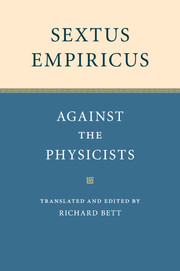Book 2
Published online by Cambridge University Press: 30 September 2021
Summary
PLACE ( 1 – 3 6 )
Concepts of place and their relation to neighboring concepts (1–5)
[1] Following the impasses we raised before about body and limits, against both the physicists and the geometers, seems to be the investigation about place; for it is held by everyone unanimously that body either is contained in place or travels over place. [2] For this reason we should begin by observing that according to Epicurus one part of the so-called intangible nature is named void, another place, and another space; the names change according to the different points of view, since the same nature is spoken of as void when in a condition of lacking all body, but is called place when occupied by a body, and becomes space when bodies go through it. However, the general term “intangible nature” is applied to it in Epicurus because of its being devoid of resistant touch. [3] And the Stoics say that void is what can be occupied by a being, but is not occupied, or a distance without body, or a distance not occupied by body, whereas place is what is occupied by a being and made equal to what occupies it – now calling body “being,” as is clear from the alternation of the names; and they say that space is a distance that is occupied over one region but unoccupied over another. [4] But some have said that space is the place of the larger body, so that space differs from place in the following respect: the latter does not indicate magnitude of the body that is contained in it (for even if it contains a minimal body, it is nonetheless referred to as place), but the former indicates non-negligible magnitude of the body in it. [5] Well, then, we have done a complicated investigation of void in “On Elements,” and it is not necessary to repeat the same argument now. At present, however, we will inquire into place, as well as space, which is connected with it, and is itself place generically speaking.
- Type
- Chapter
- Information
- Sextus EmpiricusAgainst the Physicists, pp. 81 - 146Publisher: Cambridge University PressPrint publication year: 2012

